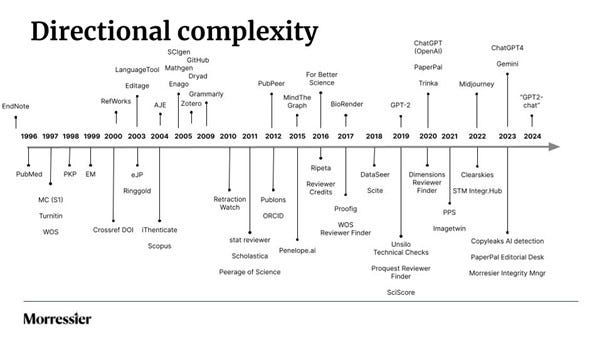After a bit of a hiatus, I’m back into writing mode with an AI-focused issue of PubTech Radar. Let’s start with a bit of big-picture thinking before diving into a couple of areas that have caught my attention.
Complexity in publishing:
I like this slide about Directional Complexity in publishing by Neil Blair Christensen.
In his CSE Portland presentation, Neil says “Technology assists us in working with greater complexity at a greater scale. Still, directionally it also triggers the need for more technology to keep up with the use of technologies elsewhere in workflows - complexity will continue to increase.” Building on the theme of complexity, in The Challenges and Opportunities of Researcher-Driven Publishing Adam Hyde succinctly describes problems with the publishing ecosystem and outlines five strategies to improve the current situation. It’s hard to disagree with Adam’s thinking, we do need smarter, simpler, and more elegant solutions that use AI to reduce complexity but I’m not sure this is what we’re going to get. Sadly, I suspect we’re going to build in more complexity as we layer AI services onto creaking legacy technologies creating an ever more complex ecosystem.
AI and research:
Ethan Mollick’s newsletter One Useful Thing is always worth a read but I think his Four Singularities for Research, is particularly insightful into how GenAI may change how academics write and publish, how and what research is done, and how findings are communicated this research.
AI summaries:
Ethan has created a GPT aimed at the general public called But why is it important? which tells you why an academic paper might matter to you. I think summarization might be the thing that disrupts academic publishing. There are several excellent summary services available, such as Scholarcy, which boosts personal productivity. These services coexist with traditional research papers by storing the summaries in personal libraries but what happens if the research community starts to treat summaries as shareable research objects? What happens if these summaries are easily accessible online, citeable, and given a doi? What happens if these summaries are personalized to draw out specific areas of interest, or enhanced to add additional data to support or challenge the claims in the paper? Could one publisher use summaries to build the fabled iTunes of research that becomes the primary way time-pressured researchers interact with research findings?
AI summaries and search:
AI summaries atop Google’s search results are starting to appear but with problems. Research Integrity issues have dominated publishing conversations of late but Chirag Jay Patel is right to challenge publishers about how they plan to adapt to a World where AI-enhanced search engines answer users’ questions and website traffic drops.
AI in Peer Review:
Chris Leonard from Cactus Communications has an excellent new newsletter about AI and peer review called Scalene. AI-assisted peer review technology is coming and there are some really exciting start-ups working on solutions in this space.
AI and open science:
The Open Science program at CZI and Alfred P. Sloan Foundation Technology Program are requesting community input about “existing applications of AI to transform scientific work that are consistent with open research practices”. The RFI aims to identify existing tools that harness AI to increase reproducibility and transparency, increase the productivity of scientists, facilitate the reuse of resources, expand access, and reduce barriers to participation in research. Hopefully, the findings of the RFI will be published and should make for interesting reading.
AI Licensing:
Jane Friedman’s summary is worth a read to catch up on this rapidly developing area. Informa has announced that it has signed a deal with Microsoft involving “access to advanced learning content and data, and a partnership to explore AI expert applications” prompting the inevitable backlash from authors. In the meantime, MIT Press is valiantly trying to stop their OA content from being used in AI systems without written permission via messaging in the cookie banner:
(H/T Lisa Janicke Hinchliffe)
Perplexity has launched a new service called Pages. Adding to the flood of AI content, here are a couple of pages I created on the topic of academic publishers signing licensing deals with GenAI companies, this one is 100% generated and took about a minute to create. For this one I asked Perplexity to rewrite some of the sections. At present these pages are 100% generated and you can’t add/edit your copy or even change the title. I don’t know whether to be impressed or concerned about where this is heading.
Other interesting reads
AI and the Public Sphere by Peter Schoppert – “The output of an LLM is a corporate product, not just in the sense of having been created to make a profit, but also through the fact that a complex assemblage of people, finance capital, machines, interests, and a large corpus of people’s content are all involved in creating that speech, confusing our natural tendency to interpret speech as coming from a person.”
Aravind Srinivas: Perplexity CEO on Future of AI, Search & the Internet | Lex Fridman Podcast #434 (youtube.com) skip to 1.48.00 for the bit about scaping Twitter using fake academic accounts.
Is it plagiarism, or neurodivergence? By Shani W. Don’t assume someone is using GenAI just because they’ve used foster, unleash, elevate…
Prompt engineering with Retrieval Augmented Generation systems - tread with caution! | Aaron Tay's Musings about Librarianship Detailed but practical and excellent. Made me realize how little I understand about how RAG systems work
And finally….
Ray Bradbury used 98 dimes to write the first draft of "Fahrenheit 451" on a coin-operated typewriter . 75 years ago authors were writing on coin-operated typewriters, where will be in another 75 years?



So happy to see a new issue. Great list of reads, will be diving in deeper.
Welcome back! So good to see PTR in my inbox again :-)